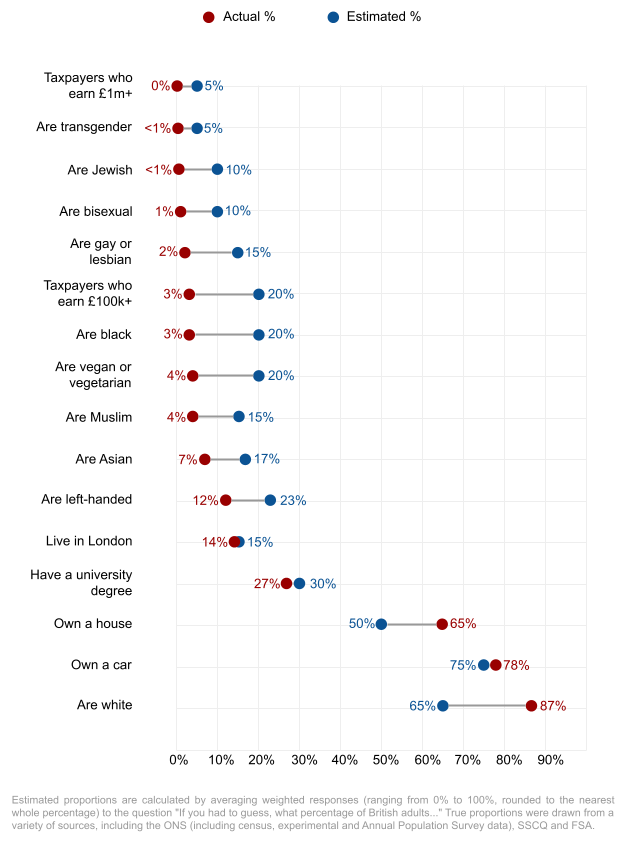Overestimating Demographics – New CCS poll by YouGov
Published By
Published On
Published In
What percentage of the adult British population do you think are Asian? How about the percentage who are bisexual? If your grasp of demography reflects that of the general population then you are likely to exaggerate these numbers. New YouGov polling data commissioned by the Campaign for Common Sense shows that the British population generally overestimates the size of minority groups in the country, sometimes by a factor of 8 or more. According to the most recent ONS results from the Annual Population Survey (2020), for example, roughly 969,000 adults identify as gay or lesbian – about 1.8% of the population. Yet when asked for their estimate, the public are under the impression that this number is actually 15%, or around 8 million people. It’s a similar story across minority group categories. The number of British Muslims is inflated by a factor of 3.4, the number of black adults in the UK is overestimated by a factor of over 5.5 and the number of British Jews is overstated by a factor of almost 20.

There are a number of plausible explanations for this, ranging from an imported focus on identity from the United States and a disproportionate portrayal of minority groups in the media to a deficiency in how the population understands statistics. The causes may also vary according to the question asked. For example, people underestimated the percentage of homeowners in Britain, perhaps as a function of persistent media reporting on first-time buyer barriers and consistently high property prices.
Whatever the roots of the discrepancies, in some areas of working life this should come as good news to those who care about genuine diversity in the UK, and bad news for some diversity, equity and inclusion officers who may be alarmed to realise – albeit somewhat later than the rest of us – the redundancy of their chosen vocations in multiple industries. The NHS spends millions of pounds on such roles, yet according to its own reporting on ethnic diversity within the organisation, minority groups are overrepresented: “Asian people made up 10.7% of NHS staff, compared with 7.2% of working age people; black people made up 6.5% of NHS staff, compared with 3.4% of working age people; and people from the Other ethnic group made up 2.6% of NHS staff, compared with 1.1% of working age people.” The difference is even greater at the more senior levels of medical care. As the Commission on Race and Ethnic Disparities noted in its 2021 report, “The gravitational force of dominant narratives tends to point our attention in negative directions, such as racist abuse on social media, and away from positive ones, the fact, for example, that 40% of NHS consultants are from ethnic minorities.”
Does all this actually matter, though? Should we not simply celebrate Britain’s diversity and the success that many British citizens from ethnic minority communities have experienced in this country? Well, of course we bloody should. But that is not what we’re doing, and herein lies the danger of a US-inspired focus on identity and concepts such as ‘systemic racism’. Instead we see self-flagellation – a distortion of a tolerant country into one whose institutions, ethos and people are permeated with discrimination. As one well-known figure put it recently, “This idea we’re a very tolerant nation, the British – ugh.”
Of course there is discrimination in Britain – we are a country comprised of imperfect individuals just like any other, with its attendant fallibilities and areas for improvement – and we are right to continue to point it out and deal with it appropriately whenever it rears its grisly head. But ours is also a welcoming, sympathetic and tolerant society which has made laudable progress when it comes to diversity – comparable to any other country – and is improving all the time. The results of this poll should provide some nuance – when you look at the real numbers, we aren’t doing too badly after all.
See Lionel Shriver’s comment on the data in The Times here